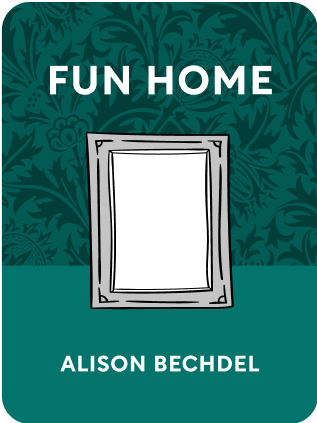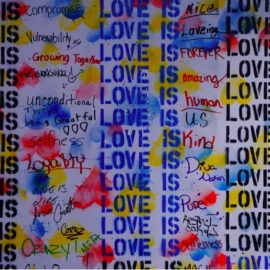

This article is an excerpt from the Shortform book guide to "Fun Home" by Alison Bechdel. Shortform has the world's best summaries and analyses of books you should be reading.
Like this article? Sign up for a free trial here .
Who was Bruce Bechdel? What is his role in Alison Bechdel’s book Fun Home?
Bruce Bechdel was the father of Alison Bechdel. The two had a difficult relationship due in part to her father’s tumultuous nature and repressed sexuality.
Read more about Bruce Bechdel and his relationship with daughter Alison.
Bruce Bechdel: Alison Bechdel’s Father
Alison’s father was likely a closeted homosexual or bisexual man. Though he never directly expressed his sexuality to his family, Alison recognized a few behaviors that showed her father’s more feminine side throughout her childhood (such as his use of a bronzing stick). She implies that her father’s repression was a source of self-loathing and misplaced anger. She compares her father’s desire to create the image of a perfect home despite its disrepair to his desire to create the image of the perfect man despite his inner struggle.
Bruce Bechdel was sensitive to failure and disorder. He punished his children at any sign of imperfection, even if they hadn’t done anything wrong. For example, he once asked the family why a vase had gotten so close to the edge of the table. No one responded, so he proceeded to grab and spank Alison as she cried that she hadn’t done anything.
He was not only sensitive to the perceived failures of his children, but he was also sensitive to his own. For example, one of Alison’s brothers once commented on the peace signs on their father’s tie. It was not a critique, just an observation. Despite the fact that he was running late, Alison’s father immediately ran up to his room and changed ties. After this incident, their mother told them that they were no longer allowed to make comments on their father’s appearance, even if their comments weren’t critical.
Though he had his moments of kindness, these actually made the tension in the house worse. The children never knew what version of their father they were going to get, so they had to navigate every interaction with their father with finesse.
Opposites
Alison and Bruch Bechdel were polar opposites of one another. Throughout her childhood, this led to constant tension and disagreement:
- Where her Bruce Bechdel loved extravagance, Alison loved functionality. Her father wanted opulent, period-specific decor. Alison wanted to live in an all-metal, submarine inspired room. When attending a wedding, Alison’s father wore a luxurious velvet suit. Conversely, Alison wanted to wear sneakers.
- Where her father was more feminine, Alison was more masculine. Her father loved dressing Alison up in girly clothing and wearing makeup. Alison didn’t care about clothing and wore her hair short. She calls herself the “Butch” to her father’s “Sissy.”
- Where her father craved isolation, Alison craved interaction. Alison adored her and her father’s occasional game of airplane. It gave her the physical contact that she craved, but very rarely received from him.
Alison’s Father and the Police
Alison’s father had a run-in with the police after an incident with an underage boy. Her father picked up a 17-year old and told him that his brother had gone missing. The boy got in the car and they went looking for his brother. During their search, her father purchased a six-pack of beer and offered the boy a drink. Alison’s father was sent a summons and was charged with giving alcohol to a minor. Though Alison never knew the nature of her father’s relationship with the boys, she later inferred that it was sexual.
While in court, the magistrate focused solely on the alcohol charge and never brought up the nature of Alison’s father’s relationship with the two boys. The judge agreed to dismiss the charges if he agreed to 6 months of counseling. Alison implies that the nature of the sentencing had little to do with the liquor charge and more to do with the unspoken accusation: a homosexual act with a minor.
Bruce Bechdel’s Death
Alison Bechdel’s father died after he was hit by a truck while clearing brush from a home he was planning to renovate. The truck driver stated that Alison’s father jumped backward into the road as if he had seen a wild animal. Alison doesn’t know for sure, but she believes that his death was a suicide. She points to the facts that Alison’s mother had just filed for divorce and that her father had been reading literature that implied that life was meaningless.
Though Alison and her mother believed his death was deliberate, Alison mentioned later that perhaps her family chose to believe that because, to them, it was less painful. It gave her father agency over his own death. He chose when he wanted to die and went through with it.
She struggled to comprehend her father’s passing. She spent her childhood watching her father prepare bodies for funerals. When it was time for his, she asked herself, “Who prepares the body of the man who prepares the bodies?” At Bruce Bechdel’s funeral, she and her brothers showed little emotion. In fact, the only moments where she felt consolation was in violently brushing off someone’s hand who was trying to support her. This was likely because the action elicited an emotion from her during a time that she was mostly feeling numb.

———End of Preview———
Like what you just read? Read the rest of the world's best book summary and analysis of Alison Bechdel's "Fun Home" at Shortform .
Here's what you'll find in our full Fun Home summary :
- What it's like to grow up in a funeral home
- Why Alison Bechdel suspected her dad was a closeted homosexual
- Why Alison believes that her father's death may have been a suicide






